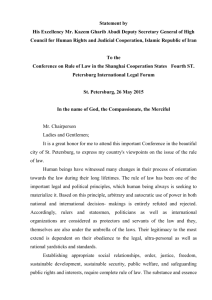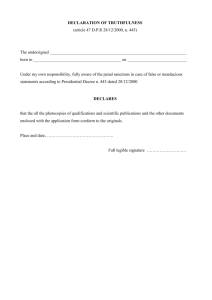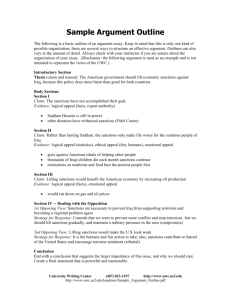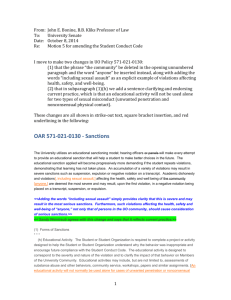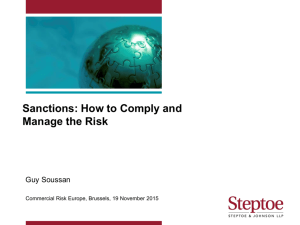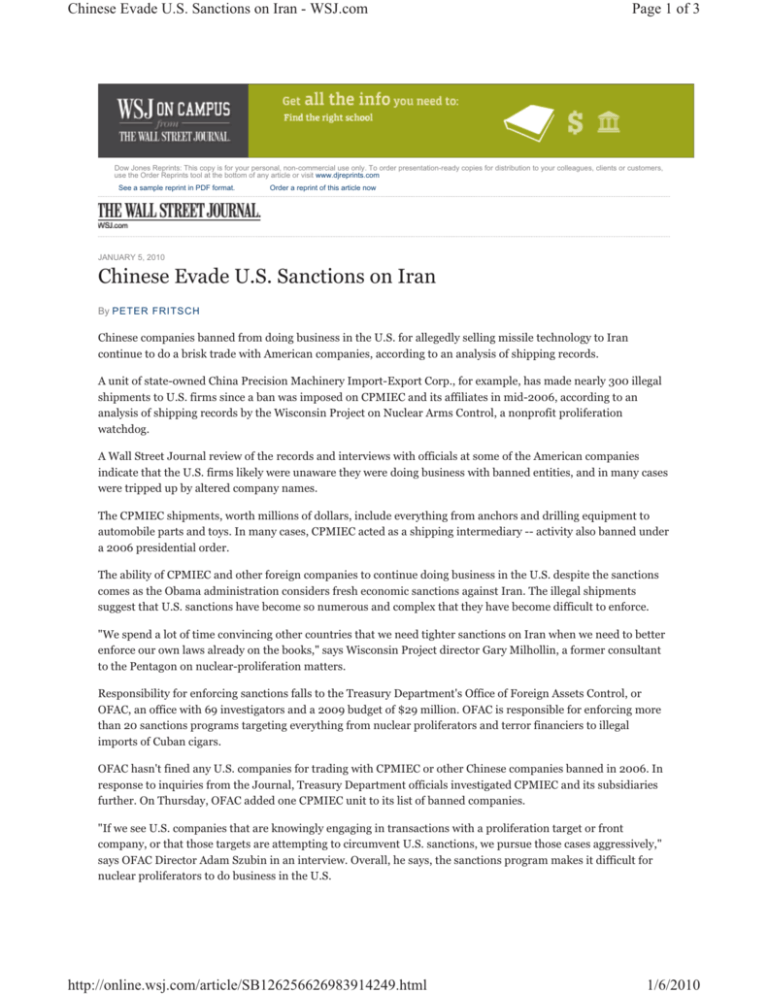
Chinese Evade U.S. Sanctions on Iran - WSJ.com
Page 1 of 3
Dow Jones Reprints: This copy is for your personal, non-commercial use only. To order presentation-ready copies for distribution to your colleagues, clients or customers,
use the Order Reprints tool at the bottom of any article or visit www.djreprints.com
See a sample reprint in PDF format.
Order a reprint of this article now
JANUARY 5, 2010
Chinese Evade U.S. Sanctions on Iran
By PETER FRITSCH
Chinese companies banned from doing business in the U.S. for allegedly selling missile technology to Iran
continue to do a brisk trade with American companies, according to an analysis of shipping records.
A unit of state-owned China Precision Machinery Import-Export Corp., for example, has made nearly 300 illegal
shipments to U.S. firms since a ban was imposed on CPMIEC and its affiliates in mid-2006, according to an
analysis of shipping records by the Wisconsin Project on Nuclear Arms Control, a nonprofit proliferation
watchdog.
A Wall Street Journal review of the records and interviews with officials at some of the American companies
indicate that the U.S. firms likely were unaware they were doing business with banned entities, and in many cases
were tripped up by altered company names.
The CPMIEC shipments, worth millions of dollars, include everything from anchors and drilling equipment to
automobile parts and toys. In many cases, CPMIEC acted as a shipping intermediary -- activity also banned under
a 2006 presidential order.
The ability of CPMIEC and other foreign companies to continue doing business in the U.S. despite the sanctions
comes as the Obama administration considers fresh economic sanctions against Iran. The illegal shipments
suggest that U.S. sanctions have become so numerous and complex that they have become difficult to enforce.
"We spend a lot of time convincing other countries that we need tighter sanctions on Iran when we need to better
enforce our own laws already on the books," says Wisconsin Project director Gary Milhollin, a former consultant
to the Pentagon on nuclear-proliferation matters.
Responsibility for enforcing sanctions falls to the Treasury Department's Office of Foreign Assets Control, or
OFAC, an office with 69 investigators and a 2009 budget of $29 million. OFAC is responsible for enforcing more
than 20 sanctions programs targeting everything from nuclear proliferators and terror financiers to illegal
imports of Cuban cigars.
OFAC hasn't fined any U.S. companies for trading with CPMIEC or other Chinese companies banned in 2006. In
response to inquiries from the Journal, Treasury Department officials investigated CPMIEC and its subsidiaries
further. On Thursday, OFAC added one CPMIEC unit to its list of banned companies.
"If we see U.S. companies that are knowingly engaging in transactions with a proliferation target or front
company, or that those targets are attempting to circumvent U.S. sanctions, we pursue those cases aggressively,"
says OFAC Director Adam Szubin in an interview. Overall, he says, the sanctions program makes it difficult for
nuclear proliferators to do business in the U.S.
http://online.wsj.com/article/SB126256626983914249.html
1/6/2010
Chinese Evade U.S. Sanctions on Iran - WSJ.com
Page 2 of 3
In June 2006,
the U.S. banned
CPMIEC and
three other
Chinese
companies from
conducting
business in the
U.S., citing their
alleged sales of
missile
technology to
Iran in defiance
of previous
sanctions. Two
months later, a
shipment of oildrainage tanks
from Shanghai landed at the port of Tacoma, Wash., bound for a New York City firm, American Forge & Foundry
Inc. The shipper: a unit of CPMIEC, according to a shipping record known as a bill of lading.
Officials at CPMIEC didn't respond to written questions from the Journal.
U.S. enforcement officials say it can be difficult for U.S. companies to avoid doing business with foreign
companies and individuals under sanction. Problems with translating company names can be an issue, they say.
Sanctioned companies also have proved adept at creating aliases or subsidiary shell companies to mask their
ownership, they say.
"To the extent that a U.S. institution does process a transaction for a designated entity, those transactions tend to
be inadvertent and are corrected quickly upon detection," says the OFAC's Mr. Szubin.
It is unlikely that most U.S. companies knowingly flout the import bans: Criminal penalties for doing so include
prison time.
John Iliff, general manager of American Forge & Foundry, says the single shipment of oil-drainage tanks it
received in 2006 from the CPMIEC unit set off no alarms. "Trading in illegal goods certainly never crossed our
minds," he says.
The shipment came from China JMM Import & Export Shanghai Pudong Corp., which didn't appear on any
sanctions list until Thursday. Records indicate the company shares an address and phone number with a CPMIEC
unit that was previously banned: CPMIEC Shanghai Pudong Corp. The Treasury determined that the two
companies are affiliated.
Faced with simple tweaks to company names, even large U.S. corporations with sophisticated procedures for
screening vendors can end up doing business with sanctioned firms.
Greenlee Textron, a unit of Textron Inc., in 2008 and 2009 purchased hand-held pipe benders used by plumbers
from Chinese firm Shanghai Kayama Industrial Co. Kayama hired China JMM to facilitate payment and shipping
of those goods.
Textron spokesman Michael Maynard says Greenlee was unaware of China JMM's relationship to CPMIEC before
receiving an inquiry from the Journal. He says none of the parties to the 14 shipments appeared on any U.S. lists
of sanctioned companies.
Many companies rely on software that is supposed to alert users if a company is subject to sanctions. But China
JMM didn't register a "hit" on the sanctions-screening software used by Kohler Co. of Kohler, Wis., according to a
http://online.wsj.com/article/SB126256626983914249.html
1/6/2010
Chinese Evade U.S. Sanctions on Iran - WSJ.com
Page 3 of 3
company spokesman. Until July 2009, Kohler purchased lawn-mower parts from a Shanghai firm that used
China JMM as its export broker.
After Kohler was alerted last summer to China JMM's affiliation with CPMIEC, it "immediately halted all
orders...until our supplier found a new export broker," the spokesman says.
U.S. authorities have called CPMIEC a "serial proliferator." The U.S. first sanctioned the firm in 1991 and 1993 for
selling short-range-missile technology to Pakistan. After passage of the Iran Nonproliferation Act in 2000, the
company was sanctioned in 2002 and 2003 for missile-related sales to Iran.
The Chinese government, CPMIEC's owner, has objected to U.S. trade sanctions on nonproliferation grounds.
"This kind of mistaken practice...damages the atmosphere for Sino-American cooperation on nonproliferation,
and is not beneficial to promoting international nonproliferation efforts," says Jiang Yu, a spokeswoman for
China's Ministry of Foreign Affairs.
In 2006, LIMMT Economic & Trade Co., a Chinese seller of metallurgical products, was blocked from selling
goods in the U.S. for allegedly selling high-strength metals and sophisticated military materials to Iran.
In April 2009, a New York grand jury indicted LIMMT and its owner, Li Fang Wei, for allegedly conspiring to
evade that ban by using aliases, and the U.S. Treasury updated its sanctions list to include those aliases.
In 2006, Dalian Sunny Industry & Trade Co. sent seven shipments of steel parts to Coastal Flange Inc. in
Houston. (The 2009 case established that Dalian was an LIMMT affiliate.) In 2007, the shipments began coming
from Dalian Orient Pipe Components Co. Bills of lading reveal that Dalian Sunny and Dalian Orient share the
same address and telephone number.
Officials at LIMMT, Dalian Sunny and Dalian Orient didn't return calls seeking comment.
Mark Mekeel, president of Coastal Flange, says U.S. prosecutors contacted him about his trade with Dalian, but
told him he had done nothing wrong.
"Each day I'm pounded on email by offers from Chinese companies," he says. "But I'm not part of some scam. I'm
just a guy trying to bring in some product."
Write to Peter Fritsch at peter.fritsch@wsj.com
Printed in The Wall Street Journal, page A8
Copyright 2009 Dow Jones & Company, Inc. All Rights Reserved
This copy is for your personal, non-commercial use only. Distribution and use of this material are governed by our Subscriber Agreement and by
copyright law. For non-personal use or to order multiple copies, please contact Dow Jones Reprints at 1-800-843-0008 or visit
www.djreprints.com
http://online.wsj.com/article/SB126256626983914249.html
1/6/2010



